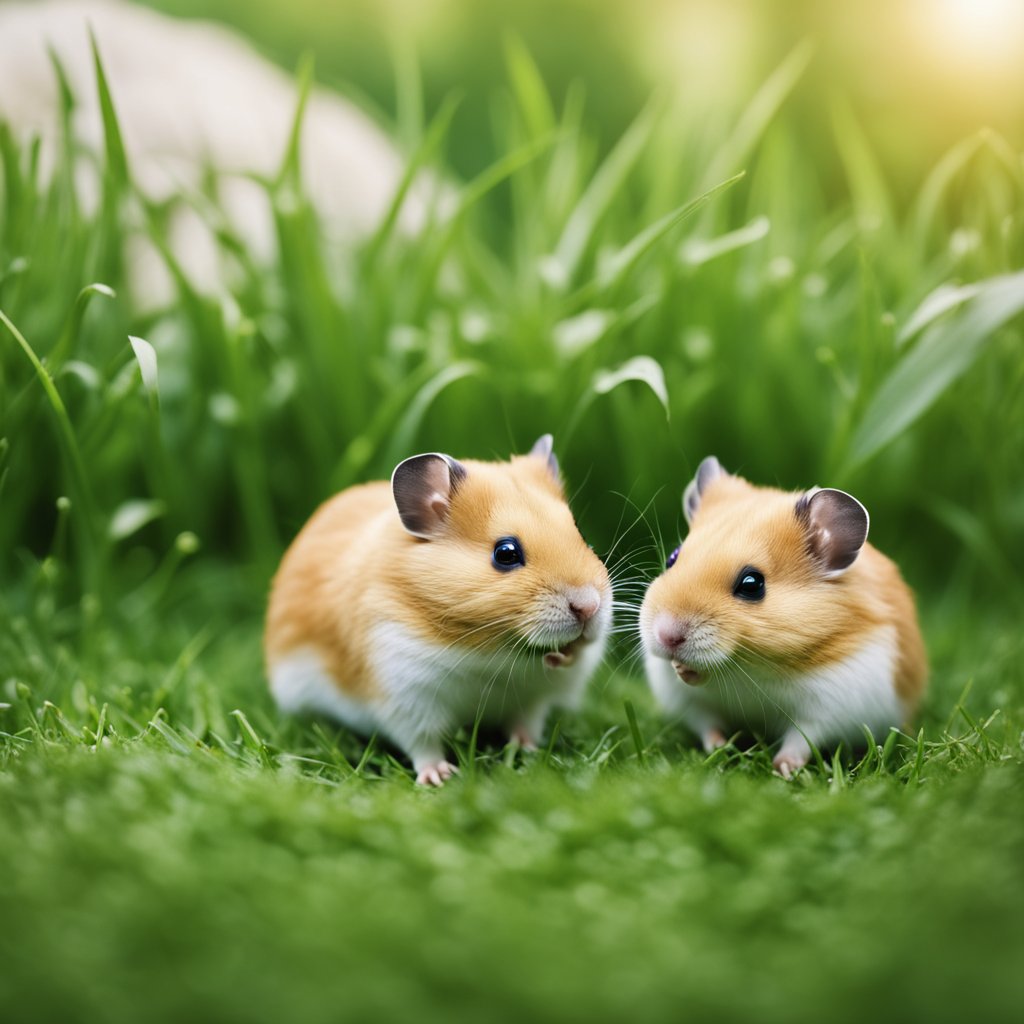Can Hamsters Eat Grass? A Comprehensive Guide to Feeding Your Pet Hamster
Hamsters are adorable and popular pets that have been bred in captivity for over a century. They are known for their small size, fluffy fur, and cute personalities. In the wild, hamsters are omnivores and eat a variety of foods such as fruits, vegetables, and insects. However, when it comes to feeding your pet hamster, it’s important to understand their dietary needs and restrictions to ensure they stay healthy.
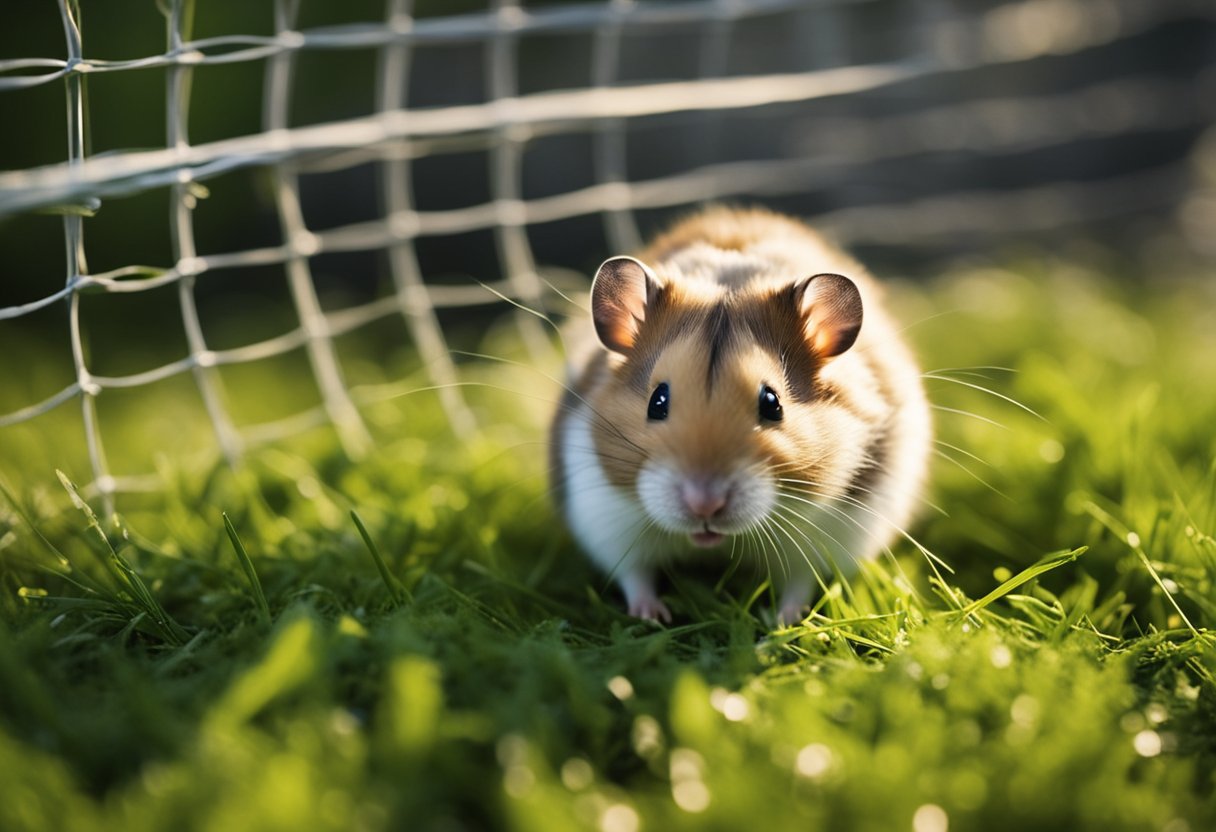
One of the questions that many hamster owners have is whether or not their furry friend can eat grass. Grass is a common food for many other animals such as rabbits, guinea pigs, and horses. However, hamsters have a unique digestive system that is different from these animals. So, can hamsters eat grass? The answer is yes, but in moderation.
When it comes to feeding your hamster grass, it’s important to remember that their digestive system is not designed to digest large amounts of grass. Too much grass can cause digestive problems and lead to health issues. It’s recommended to offer your hamster grass as a treat rather than a staple food. Now, let’s take a closer look at hamster dietary basics and grass consumption in hamsters.
Key Takeaways
- Hamsters can eat grass, but in moderation.
- Grass should be offered as a treat rather than a staple food.
- Hamsters have a unique digestive system that is different from other animals.
Hamster Dietary Basics
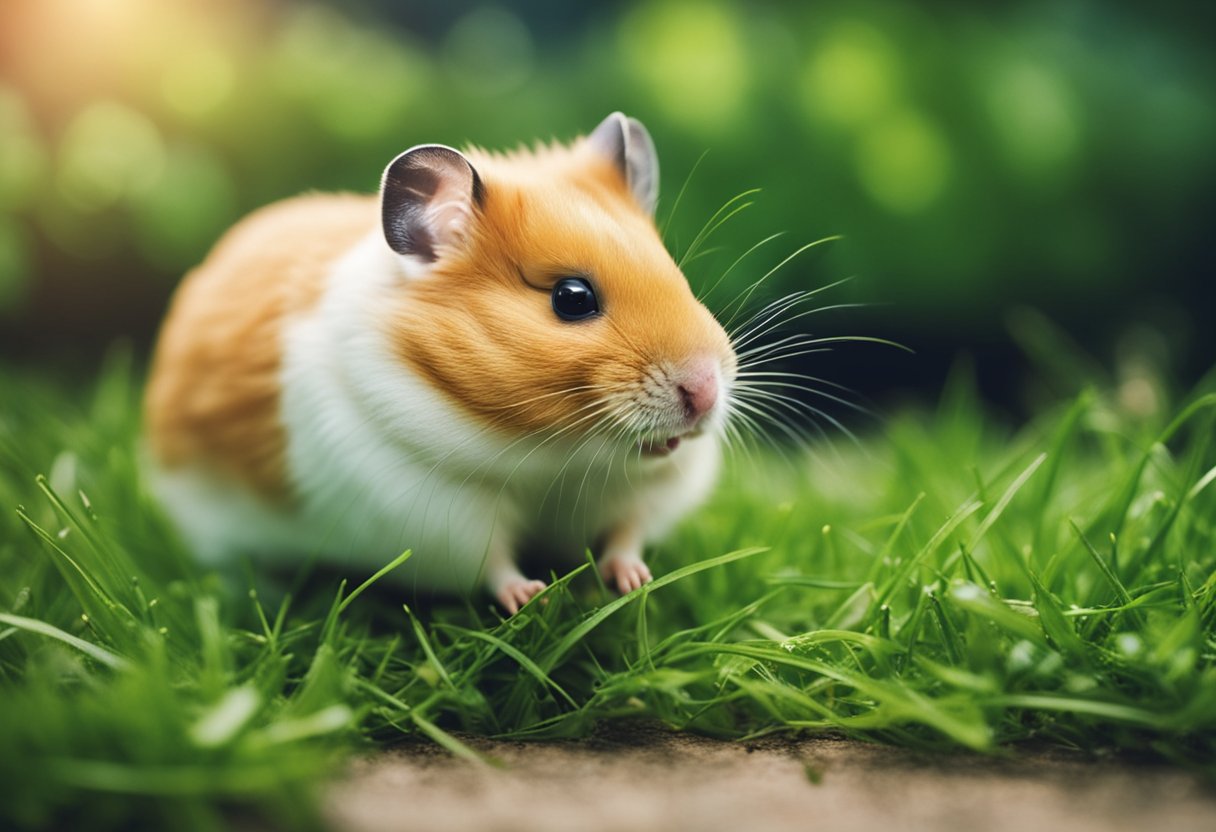
Nutritional Needs
As a hamster owner, it’s important to understand your pet’s nutritional needs. Hamsters are omnivores, which means they eat both plant and animal-based foods. They require a diet that is high in protein, fiber, and fat. According to the American Society for the Prevention of Cruelty to Animals (ASPCA), a hamster’s diet should consist of:
- High-quality commercial hamster food
- Fresh, clean water
- Occasional treats
It’s important to note that hamsters have a sensitive digestive system, and their diet should be carefully monitored to prevent health problems.
Safe Foods for Hamsters
While hamsters can eat a variety of foods, not all foods are safe for them. Some foods can cause digestive issues, while others can be toxic. Here are some safe foods that you can feed your hamster:
| Food | Notes |
|---|---|
| Commercial hamster food | Provides a balanced diet |
| Fresh vegetables | Carrots, broccoli, and spinach are good choices |
| Fresh fruits | Apples, bananas, and strawberries are safe in small amounts |
| Cooked eggs | A good source of protein |
| Cooked chicken | Another good source of protein |
It’s important to note that while hamsters can eat grass, it should be given in moderation. Too much grass can cause digestive issues, so limit the amount to a few stems at a time, a few times a week. Additionally, avoid feeding your hamster foods that are high in sugar, fat, or salt, as these can cause health problems.
By providing your hamster with a balanced diet and monitoring their food intake, you can help ensure that they stay healthy and happy.
Grass Consumption in Hamsters
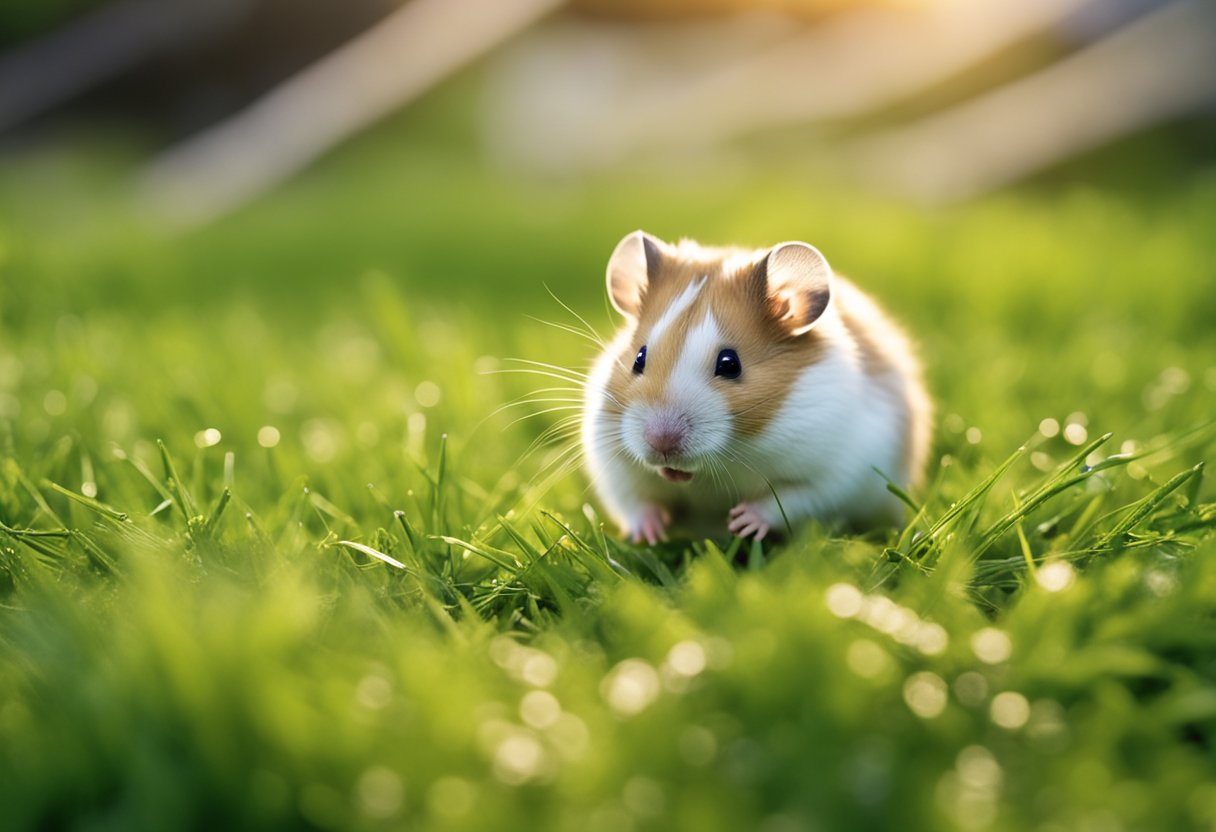
Hamsters are omnivores, and they can eat a variety of foods, including fruits, vegetables, and grains. Grass is also a food that hamsters can eat, but it should be given in moderation. In this section, we will discuss the benefits of grass for hamsters, the potential risks of consuming too much grass, and how to safely introduce grass to your hamster’s diet.
Benefits of Grass
Grass is a good source of fiber, vitamins, and minerals for hamsters. It can help promote healthy digestion and prevent constipation. The fiber in grass can also help wear down your hamster’s teeth, which is important because hamsters’ teeth never stop growing. Additionally, grass can provide your hamster with a source of hydration, which is especially important if you live in a hot or dry climate.
Potential Risks
While grass can be beneficial for hamsters, it can also pose some potential risks. Too much grass can cause digestive issues, including diarrhea and bloating. Additionally, some types of grass can be contaminated with pesticides, herbicides, or other chemicals that can be harmful to your hamster’s health. Therefore, it is important to make sure that the grass you feed your hamster is fresh and pesticide-free.
How to Safely Introduce Grass
If you want to introduce grass to your hamster’s diet, start by giving them a small piece and see how they react. If they seem to tolerate it well, you can gradually increase the amount of grass you give them. Make sure to only give them fresh, pesticide-free grass that has not been treated with any chemicals. You can also consider growing your own grass for your hamster to ensure that it is safe and free from contaminants.
In conclusion, grass can be a healthy addition to your hamster’s diet, but it should be given in moderation and with caution. By following the tips outlined in this section, you can help ensure that your hamster stays healthy and happy.
Resources
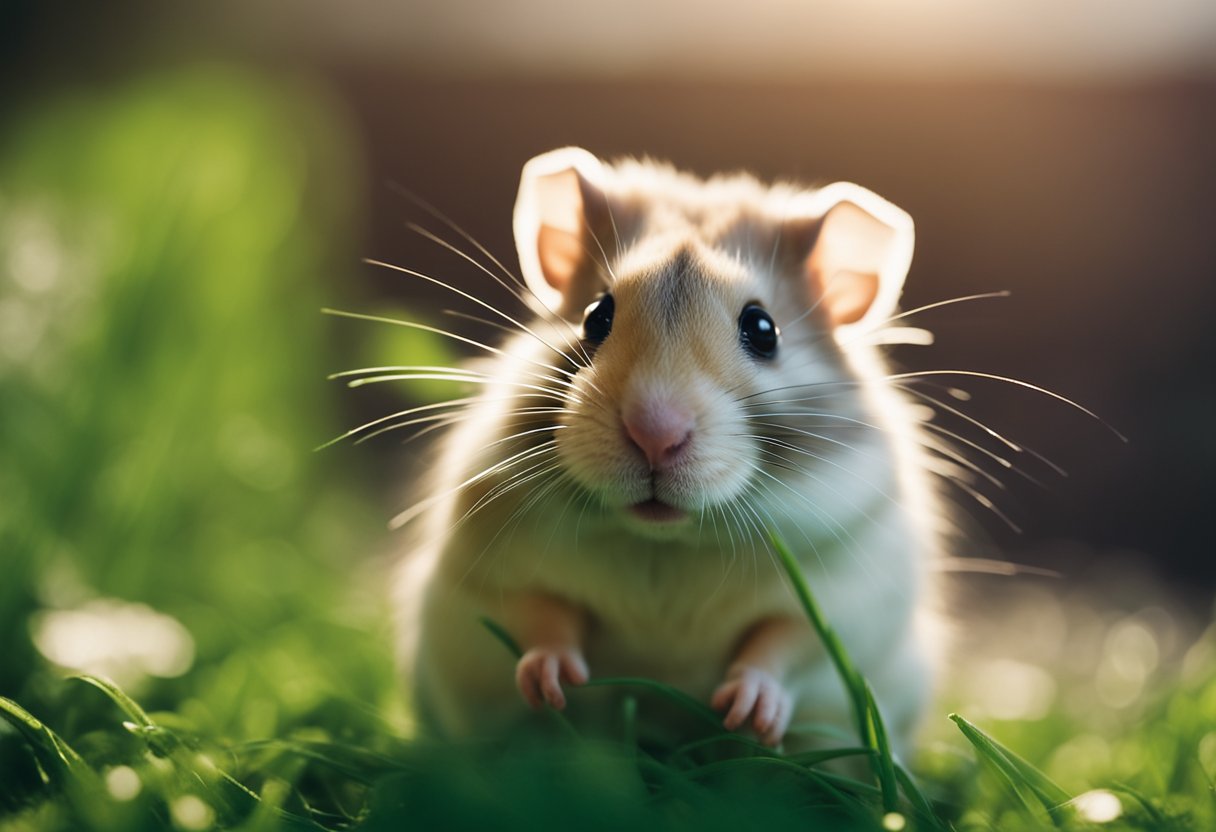
If you’re considering adding grass to your hamster’s diet, it’s essential to do your research and ensure you’re providing them with safe and nutritious options. Here are some resources to help you make informed decisions:
- PetKeen provides vet-verified facts and dietary tips for hamsters. While hamsters can eat grass, it isn’t the healthiest food for them. Their digestive systems aren’t designed to derive nutrients from grass, so there are plenty of other, more nutritious foods out there for your hammy. PetKeen also offers a range of other articles on hamster care and nutrition.
- Hepper offers vet-reviewed nutrition facts for hamsters. In certain cases, grass can be detrimental to hamsters. If a hamster eats too much grass, they may not be hungry enough to eat their pellets, which are designed to meet their nutritional needs and give them the energy they need. Eating a stem or two of grass every day or two should be safe, but more than that can start to pose a problem.
- We’re All About Pets provides a comprehensive article on whether hamsters can eat grass. While hamsters can eat grass, they can’t spend all day “grazing” on it the way many other animals can. If you decide to give your hamster grass, you’ll want to offer just a little bit, and you’ll want to be careful about where you get it from. We’re All About Pets also offers a range of other articles on pet care and nutrition.
- Small Pets HQ offers a guide on how to feed your hamster grass. While hamsters can eat grass, it’s vital to ensure that the grass is organic, fresh, and clean. Unlike their relatives, guinea pigs, and rabbits, hamsters have a distinctive digestive system that calls for a specialized diet. Grass can offer several benefits, like hydration enhancement, an antioxidant boost, and a significant source of fiber.
By using these resources, you can ensure that your hamster’s diet is healthy, balanced, and safe. It’s always important to consult with a vet if you have any concerns about your hamster’s diet or health.
Conclusion
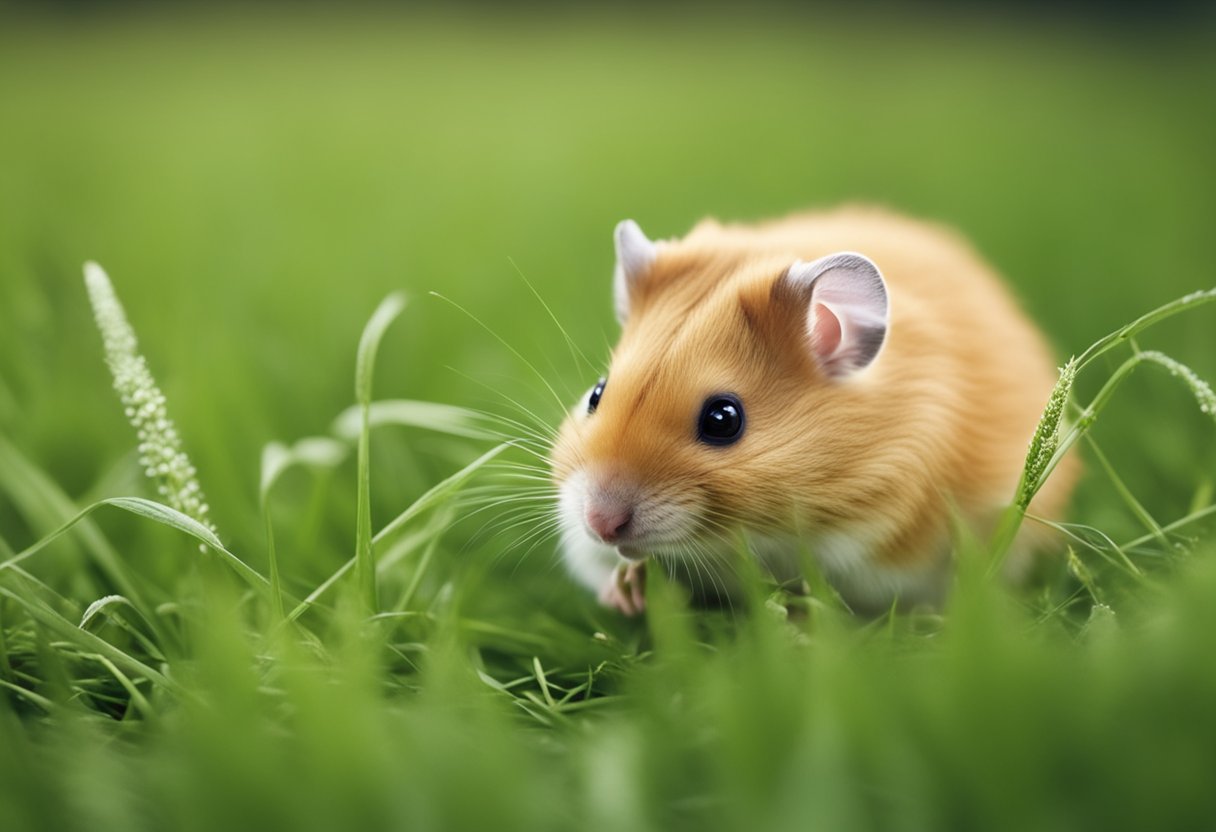
In conclusion, hamsters can eat grass, but it should only be in moderation and under strict conditions to prevent potential health issues. Grass can provide fiber and some vitamins for hamsters, but it should not be their primary food source. A balanced diet is essential for a hamster’s overall health and well-being.
When feeding your hamster grass, it is important to ensure that the grass is organic, fresh, and clean. Grass that is free of chemicals and pesticides is safe for hamsters to eat. However, it is not a nutritious treat for them and won’t meet their nutritional needs, so it shouldn’t make up a large part of their diet.
Too much grass can also cause an upset stomach, which you want to avoid. Therefore, it is recommended that you offer your hamster grass as a treat in moderation. Make sure to introduce new foods gradually and monitor your hamster’s reaction to them.
In addition to grass, you can also offer your hamster a variety of fresh fruits and vegetables as part of their diet. These foods can provide additional vitamins and nutrients that your hamster needs to stay healthy. Some examples of safe fruits and vegetables for hamsters include apples, carrots, and cucumbers.
Remember to always provide your hamster with fresh water and clean bedding to ensure their health and happiness. By following these guidelines, you can help ensure that your hamster lives a long and healthy life.
Frequently Asked Questions
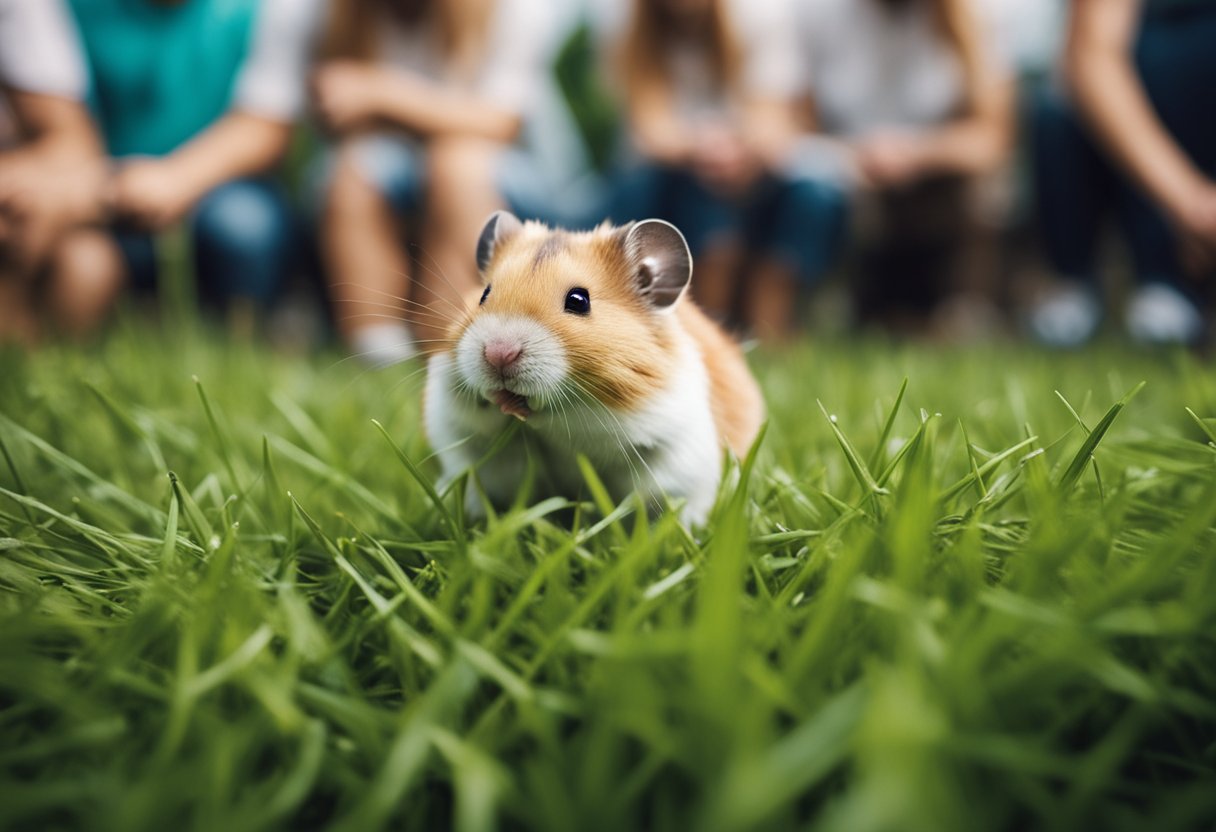
What types of grass are safe for hamsters to consume?
Hamsters can eat different types of grass, but it is important to ensure that the grass is clean and free from pesticides or other harmful chemicals. Timothy hay and meadow grass are safe options for hamsters to consume. Other types of grass such as Bermuda grass or fescue grass can cause digestive problems and should be avoided.
How often can hamsters have grass in their diet?
Hamsters should have grass in their diet in moderation. Too much grass can cause digestive problems and diarrhea. It is recommended to feed them a small amount of grass once or twice a week.
Are there any benefits to feeding hamsters dandelion greens?
Yes, dandelion greens are a good source of vitamins and minerals for hamsters. They are rich in vitamin C, A, and K, and contain calcium and iron. However, it is important to feed them in moderation as too much can cause digestive problems.
What are some common foods that are harmful to hamsters?
Some common foods that are harmful to hamsters include chocolate, caffeine, alcohol, onions, garlic, and citrus fruits. These foods can cause digestive problems, seizures, or even death.
Can feeding grass to hamsters help with their digestion?
Yes, feeding grass to hamsters can help with their digestion as it is a good source of fiber. Fiber helps to regulate their digestive system and prevent constipation. However, it is important to feed them grass in moderation.
What human foods are considered safe for hamsters to eat?
Some human foods that are considered safe for hamsters to eat include small amounts of fruits such as apples, bananas, and strawberries, and vegetables such as carrots, cucumbers, and broccoli. It is important to avoid giving them processed or high-fat foods.
